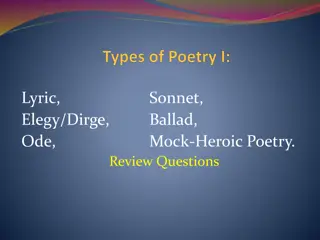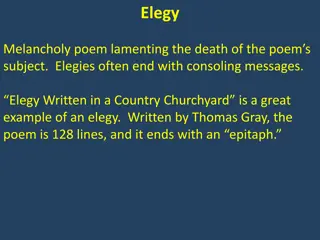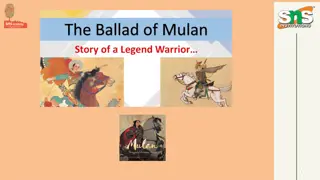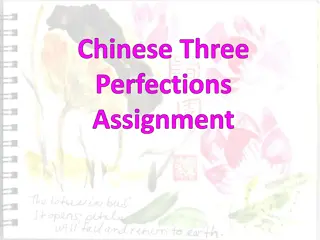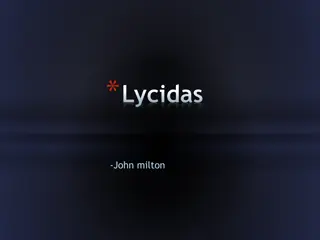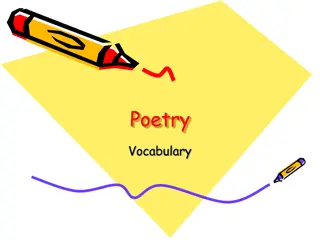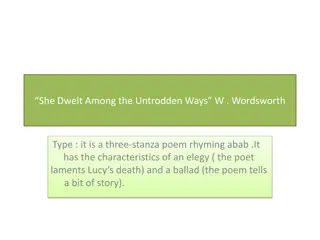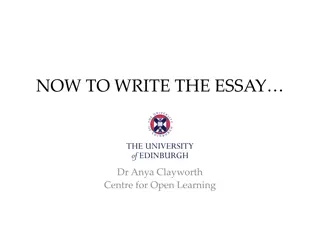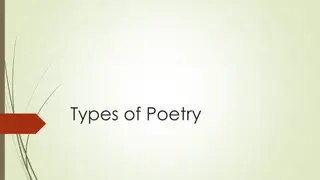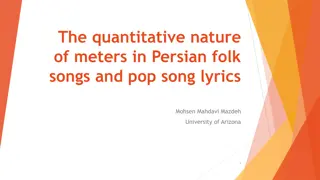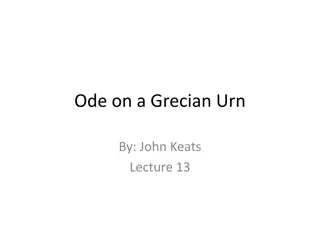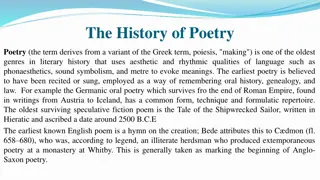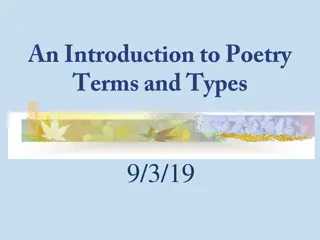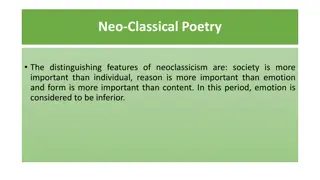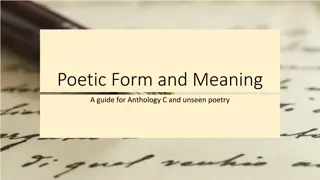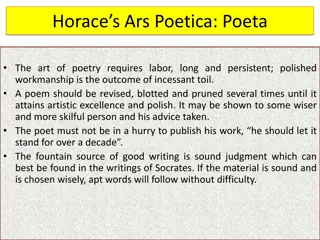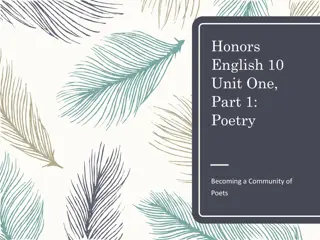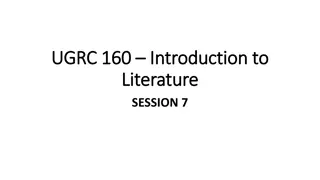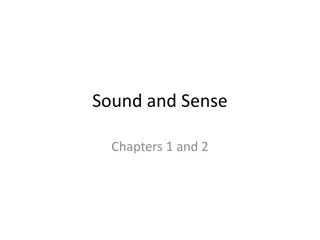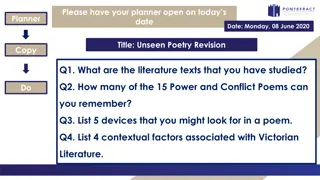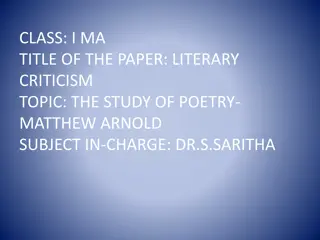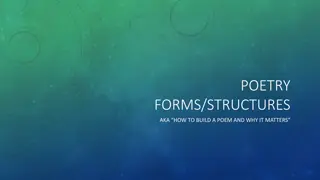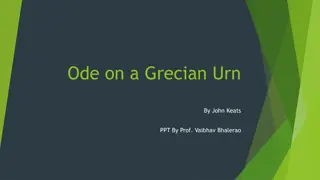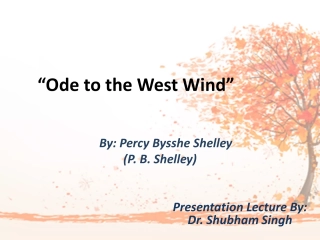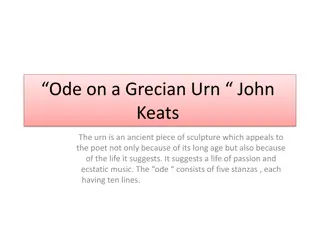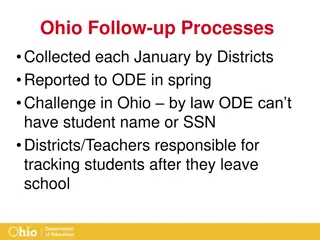Forms of Poetry - Ballad, Ode, Elegy, and Essay
Ballad is a narrative verse meant to be sung, Ode is a lyrical poetry of elevated tone, Elegy mourns the dead, and Essay is an attempt at expressing thoughts. These forms have distinct characteristics and origins, ranging from simple tales to lofty themes. Each form evokes different emotions and serves various purposes in the realm of literature.
Download Presentation

Please find below an Image/Link to download the presentation.
The content on the website is provided AS IS for your information and personal use only. It may not be sold, licensed, or shared on other websites without obtaining consent from the author. Download presentation by click this link. If you encounter any issues during the download, it is possible that the publisher has removed the file from their server.
E N D
Presentation Transcript
Ballad is one of the oldest hymns in English. The Ballad is a short story in verse. It was intended to be sung to audience. As it was developed at an early stage in Man s cultural evolution, its themes are actions rather than thoughts. They are of the simplest kind, such as a memorable feud, a thrilling adventure, a family disaster, love and war. The tale is usually fierce and tragic. It often introduces the supernatural. Ballads are the two kinds: 1) The Ballad of Growth or if unknown authorship, and 2)Literary Ballad.
The Ode is a very popular form of lyrical poetry. It is of Greet Origin. The Ode is exalted in subject matter and elevated in tone and style. It s theme is sublime and noble and its treatment is grand and dignified. The Ode addressed directly to the person or the subject it treats. The opening lines contain an appeal, which is the characteristic of the whole treatment of the poem. Evening .
The following are few popular Odes. They are Shelley s Ode to the West Wind , Keats Ode on a Grecian Urn , Tennyson s To Virgil , and Collins Ode on The Greek Ode has two forms, such as the Dorian Ode and Lesbian Ode. The Dorian Ode was choric and was sung to the accompaniment of a dance. The Lesbian Ode was simpler in form than that Pindaric and was easier for poets to imitate. It consisted of a number of short stanzas, similar in length and arrangement.
The term elegy covered war songs, lover poems and political verses in ancient Greece. It covered a wide range of subjects both grave and gay. The Greeks judged this composition by its form, not by its subject matter. It was written in the elegiac measure. Now a days, an elegy takes its name from its subject matter. The theme of an elegy must be mournful or sadly reflective. It is usually a lamentation for the dead. It is written as a tribute to someone lived and lost. The formal elegy aims at an effect of dignity and solemnity without a sense of strain. Gray s Elegy written in a country Churchyard is an ideal elegy. It is a conscious work of art, not a spontaneous expression of sorrow.
PASTORAL ELEGY: During the Renaissance, a pastoral elegy was introduced into English poetry. It followed a convention by which the poet represented himself as a shepherd bewailing the loss of a fellow shepherd. The setting and characters are taken from rustic life. Lycidas and Arnold s Thyrsis are pastoral elegies.
The Word Essay means attempt. According to Dr.Johnson Essay is a loose sally of the mind, an irregular, indigested piece, not a regular and ordinary performance. There are 2 types of Essays. They are a) objective Essays like scientific or historical event. b) personal Essays
Personal Essay Treatise and dissertation may be objective essays and the true essay is essentially personal. Master of such literary device are: Charles Lamb, R.L.Stevenson, Chesterton, Goldsmith, E.V. Lucas andA.G.Gardiner. Origin The origin of the essay is identified as Roman Period. Roman writers like CICERO and SENECA have produced essays rather than letters. Hence Bacon says that the word Essay is late but the thing is ancient
Aphoristic Essay It is Bacon who introduced essay into England. According to Montaigue I am myself the subject of my book . Then his aim is self- revelation. Thus montaigue is the father of subjective or personal essay. Bacon gave it an objective turn and his writings do not reflect the man himself.


